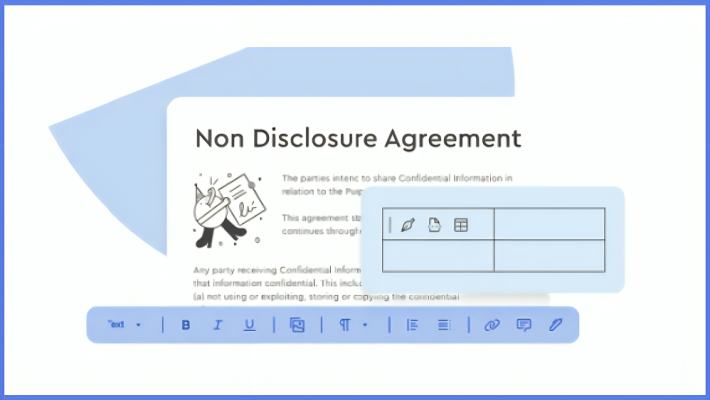Non-Disclosure Agreement (NDA)
Get in Touch to Explore More

A Non-Disclosure Agreement (NDA), also known as a Confidentiality Agreement, is a legally binding contract between two or more parties that outlines how confidential information will be shared and protected. In this agreement, one party (the disclosing party) agrees to share confidential information with another party (the receiving party), and the receiving party agrees to keep that information secret and not use it for any unauthorized purposes.
In India, NDAs are governed by the Indian Contract Act, 1872 and the Indian Evidence Act, 1872. Depending on the nature of the relationship, NDAs can be:
1. Unilateral – where only one party shares confidential information.
2. Bilateral (Mutual) – where both parties exchange confidential information.
3. Multilateral – where more than two parties are involved in sharing information.
Importance of a Non-Disclosure Agreement
An NDA plays a vital role in maintaining trust and confidentiality in professional relationships. It is often used in business transactions, partnerships, employment, mergers, or during investment discussions to safeguard trade secrets and sensitive data.
The primary purpose of an NDA is to:
1. Protect trade secrets and proprietary business information.
2. Prevent unauthorized disclosure or misuse of sensitive data.
3. Create a legal obligation to maintain confidentiality.
4. Provide remedies and legal recourse in case of breach.
5. Build trust and transparency between parties during collaboration.
Step-by-Step Process to Draft an NDA
1. Identify the Parties Involved
Clearly mention the full names, addresses, and designations of the disclosing party and the receiving party to establish who is bound by the agreement.
2. Define Confidential Information
Specify what constitutes “confidential information.” This may include trade secrets, business strategies, technical data, marketing plans, financial information, or client lists. Clearly outline the scope and nature of information protected under the agreement.
3. Establish the Obligations of the Receiving Party
State the responsibilities of the receiving party, including:
a. Not disclosing the confidential information to third parties.
b. Not using the information for any unauthorized purpose.
c. Taking reasonable steps to protect the information from unauthorized access or use.
4. Establish the Time Period
Define the duration for which the confidentiality obligation applies. This may cover both the term of the agreement and a post-termination period (commonly 2–5 years).
5. Include Exclusions
List any information that is excluded from the confidentiality obligations, such as:
a. Information already in the public domain.
b. Information already known to the receiving party before disclosure.
c. Information disclosed with the disclosing party’s written consent.
d. Information obtained from a legitimate third-party source.
6. Remedies and Penalties
Specify the consequences of breach, which may include:
a. Payment of damages or compensation.
b. Injunctions to prevent further disclosure.
c. Termination of the business relationship or agreement.
7. Governing Law and Jurisdiction
Identify the governing law under which the NDA will be enforced (generally Indian law) and specify the jurisdiction (such as Delhi, Mumbai, or Bangalore) where disputes will be resolved.
8. Signature and Execution
The agreement must be signed and dated by all parties. It is advisable to execute the NDA on non-judicial stamp paper to ensure legal validity. Each party should retain a signed copy for their records.
When Should You Use an NDA?
An NDA is essential in various business and professional situations, such as:
1. During partnerships or joint ventures where business strategies are shared.
2. When hiring employees or contractors who access confidential company data.
3. In mergers, acquisitions, or funding discussions.
4. When sharing intellectual property or product designs.
5. When onboarding vendors or consultants with access to proprietary systems.
Legal Validity of NDAs in India
Under Section 10 of the Indian Contract Act, 1872, NDAs are valid and enforceable contracts when they meet the essentials of a contract offer, acceptance, lawful object, and free consent.
In case of a breach, the aggrieved party can claim compensation for damages under Section 73 of the Act and may also seek an injunction through civil court proceedings.
Why a Lawyer Should Draft Your NDA
Although NDAs are common, they must be drafted carefully to ensure legal enforceability and adequate protection. Poorly worded clauses can render the NDA weak or ineffective.
A professional legal expert ensures that:
1. All clauses are clear, enforceable, and comprehensive.
2. The agreement is customized for your business or purpose.
3. The NDA complies with Indian laws and evidence standards.
4. You are protected from loopholes or ambiguous terms.
xLegal’s Expertise in NDA Drafting
At xLegal, our expert team of legal professionals specializes in drafting legally compliant and customized NDAs for individuals, startups, and corporations across India.
Our NDA drafting services include:
1. Drafting NDAs for employees, vendors, partners, and investors.
2. Reviewing existing NDAs for legal accuracy.
3. Advising on confidentiality, non-compete, and data protection clauses.
4. Ensuring compliance with the Indian Contract Act, 1872, and the Indian Evidence Act, 1872.
Why Choose xLegal
1. Experienced legal experts specializing in contract law.
2. Customized NDAs tailored to your business or profession.
3. 100% compliance with Indian laws.
4. Transparent pricing and quick turnaround.
5. Trusted by entrepreneurs, professionals, and corporates.
Need expert assistance? xLegal Team provides end-to-end support for this, Contact us at +91 9319661668, info@xlegal.in